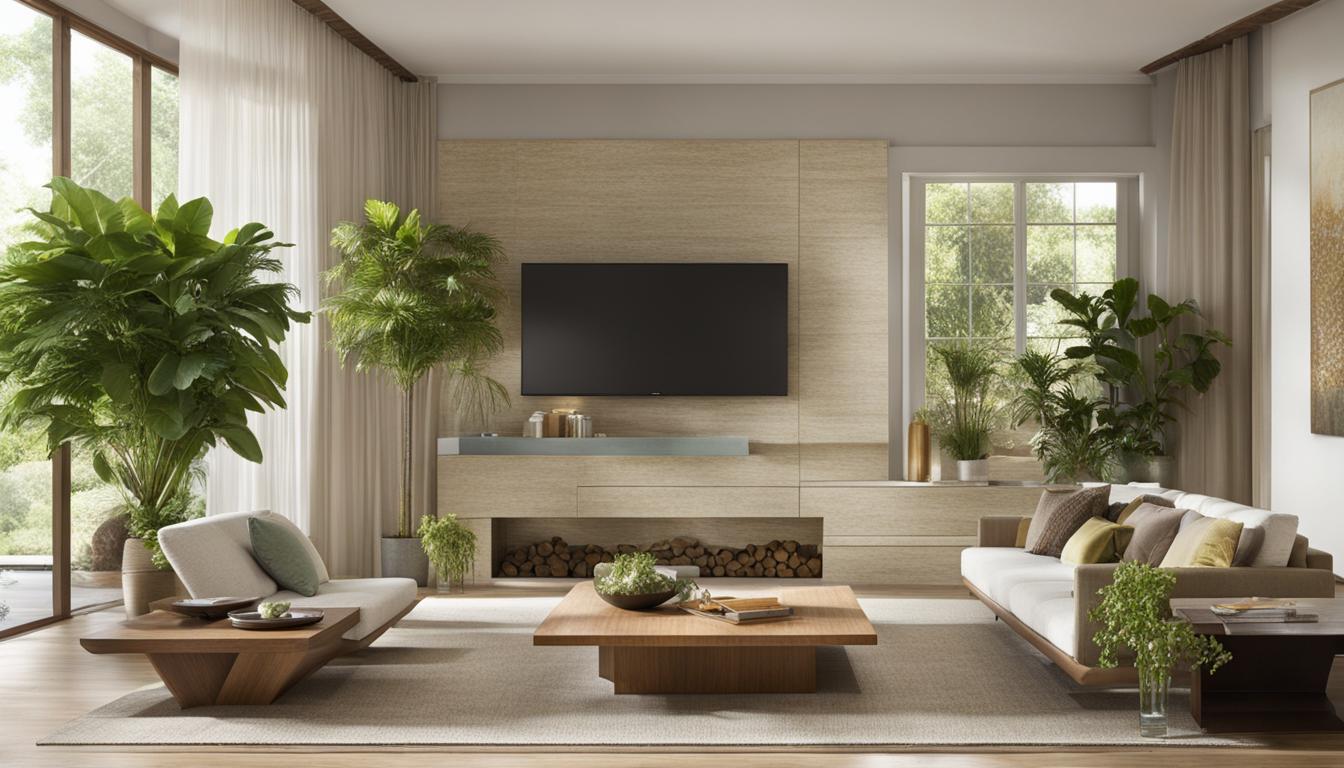Originally posted on October 31, 2023 @ 3:19 am
In this modern age, we are constantly surrounded by technology and distractions that can create chaos and unrest in our daily lives. However, there is a simple and ancient practice that can help us create a haven of peace and tranquility in our homes- feng shui.
By applying the principles of feng shui to your living room, you can create a space that not only looks beautiful but also promotes positive energy and well-being. In this comprehensive guide, we will explore the key principles and techniques of feng shui that can help you transform your living room into a sanctuary of peace and harmony.
Key Takeaways:
- Feng shui principles can promote positive energy and well-being in your living room.
- Creating a harmonious and balanced space can lead to a more relaxed and peaceful environment.
- Understanding the fundamental principles of feng shui is crucial before applying them to your living room.
- Color plays a significant role in feng shui and can influence the energy flow within a space.
- The placement of furniture, plants, lighting, and mirrors can impact the flow of energy and create a harmonious atmosphere.
Understanding the Basics of Feng Shui
Before we dive into specific tips for your living room, it’s essential to understand the fundamental principles of feng shui. Feng shui is a Chinese practice rooted in the belief that the arrangement of physical objects in a space can affect the energy flow or chi of that space. The goal of feng shui is to create a harmonious and balanced environment that promotes positive energy and well-being.
Here are some of the basic principles of feng shui:
- Yin and Yang: In feng shui, balance is key. This concept of balance is represented by the two opposing forces of yin (passive) and yang (active). To create a harmonious space, it’s essential to balance these two forces.
- Bagua Map: The Bagua is an energy map used in feng shui to identify the nine different areas of life, including wealth, fame, relationships, and health. Each area is associated with a specific color, element, and shape.
- Five Elements: The five elements of feng shui are water, wood, fire, earth, and metal. Each element is associated with specific colors and shapes and can be used to create balance and harmony in a space.
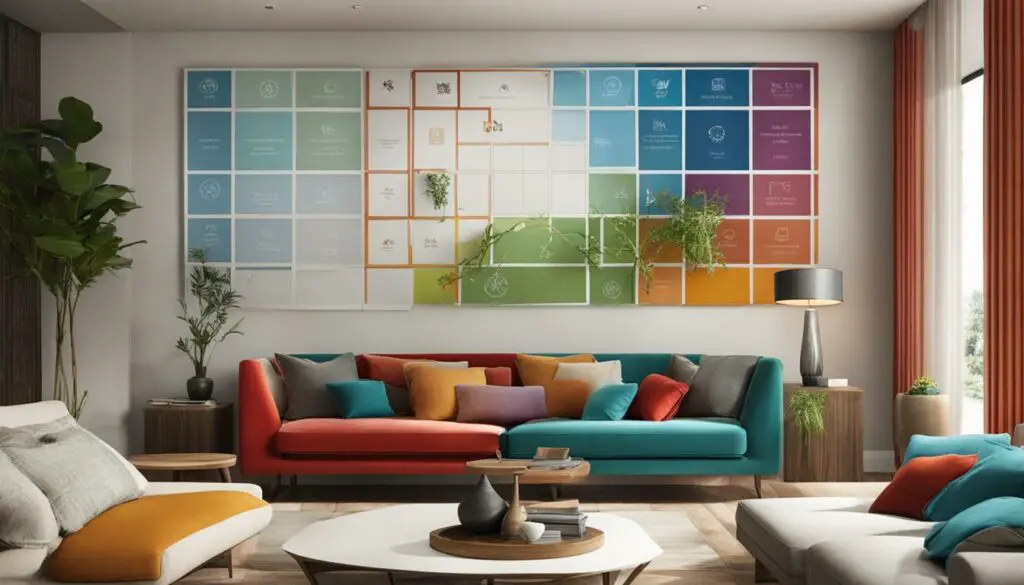
By understanding these basic principles, you can begin to apply feng shui to your living room and create a space that promotes positive energy and well-being. In the next section, we will explore how to choose the right colors for your living room based on feng shui principles.
Choosing the Right Colors for Your Living Room
The use of color is one of the fundamental principles of feng shui. By selecting colors that support positive energy, you can create a harmonious living room that promotes well-being and positivity. Here are some tips on how to choose the right colors for your living room:
| Color | Description | Effects |
|---|---|---|
| Green | Symbolizes growth, balance, and harmony | Promotes a sense of calmness and relaxation, helps reduce stress |
| Blue | Represents peace, tranquility, and abundance | Calming and soothing, helps lower blood pressure and heart rate |
| Yellow | Associated with warmth, happiness, and optimism | Brings energy and brightness to a room, uplifts mood and spirit |
| Red | Symbolizes passion, love, and power | Increase energy and excitement, encourages socialization and conversation |
| Orange | Represents creativity, enthusiasm, and success | Boosts confidence and self-esteem, encourages socialization and productivity |
It’s important to note that each color has a specific meaning and effect on the energy flow in your living room. When choosing a color, consider the function of the room, the mood you want to create, and the existing furniture and decor. Remember to balance the colors to create a sense of harmony and avoid overwhelming the space.
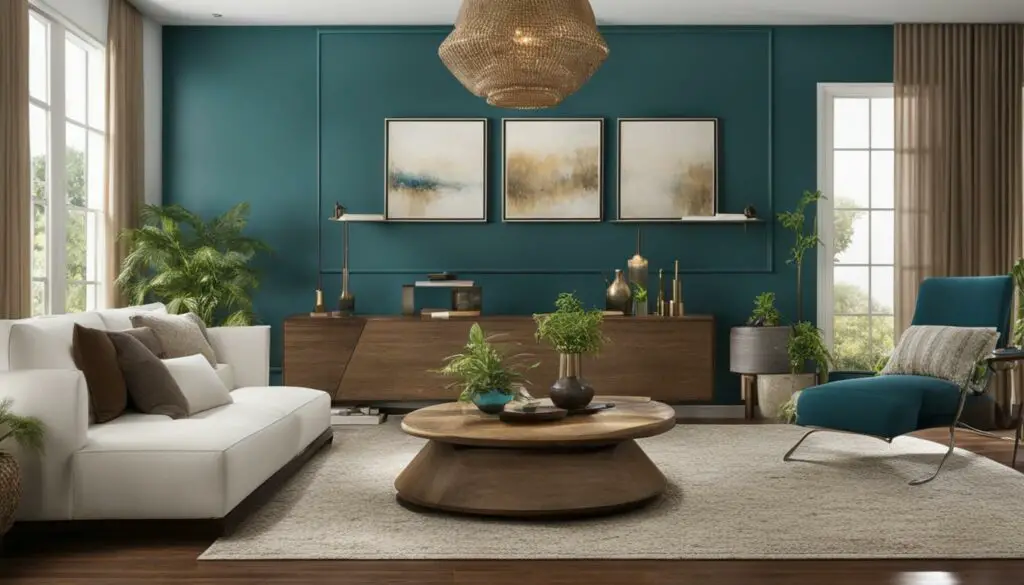
In addition to color, the quality of light in your living room is also an important consideration. Natural light is the best choice for positive energy flow, but if that’s not possible, you can use full-spectrum light bulbs to mimic natural light. Avoid harsh overhead lighting, which can create a disruptive energy flow, and instead opt for soft, ambient lighting that can be adjusted to different moods and occasions.
Feng shui encourages the use of color to promote positive energy flow in your living room. By selecting colors that align with your intentions and the principles of feng shui, you can create a serene and harmonious space that supports your well-being.
Arranging Furniture for Optimal Energy Flow
When it comes to feng shui, the placement of furniture in your living room can greatly impact the flow of energy. By arranging your furniture in a specific way, you can create a more balanced, harmonious environment.
The Commanding Position
The first thing to consider is the commanding position. This is the position that allows you to see the entrance of your living room while sitting. It provides a sense of security and control over your space.
When arranging your furniture, place your sofa and chairs in a way that allows you to see the entrance, but avoid having your back facing it. This is important because it helps you feel more relaxed and confident in your living room.
Additionally, avoid placing furniture under or in front of windows. This can disrupt the flow of energy and make your living room feel less inviting.
Balancing Your Space
Another important aspect of feng shui furniture placement is balance. Your living room should feel balanced and comfortable, with no one side feeling heavier than the other.
You can achieve this by placing your furniture in a way that creates a clear pathway throughout the room. Avoid blocking the flow of energy with large pieces of furniture or clutter.
Additionally, consider the shape of your furniture. Round and oval shapes are considered more conducive to positive energy flow, while sharp angles and corners can create negative energy.
The Five Elements
Remember the five elements of feng shui: water, wood, fire, earth, and metal. Incorporating these elements into your living room can create a more harmonious and balanced environment.
For example, you could add a water feature, such as a fountain or fish tank, to bring a calming and soothing energy to your space. Or, if you want to add some fire energy, consider adding a red or orange accent wall.
Be mindful of the colors you use in your living room, as they can also influence the energy flow and balance of the space.
By paying attention to feng shui furniture placement, you can create a more pleasant and harmonious living room that promotes positive energy and well-being.
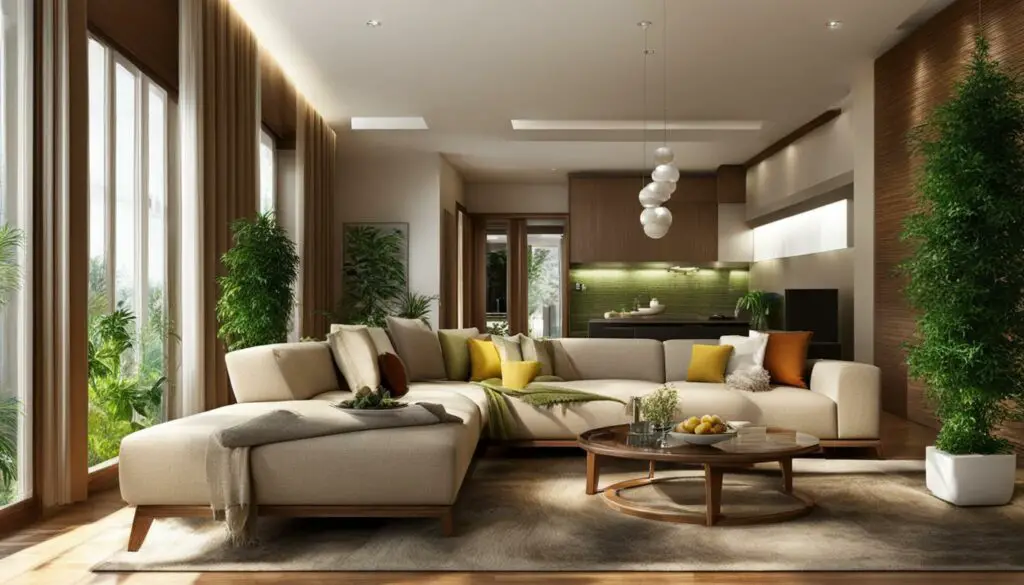
Enhancing Positive Energy with Feng Shui Elements
To create a living room that radiates positive energy and promotes harmony, it’s essential to incorporate feng shui elements. These five elements – water, wood, fire, earth, and metal – are believed to bring balance and vitality to a space.
Water is associated with calmness, abundance, and wealth. To incorporate this element into your living room, consider adding a tabletop fountain or a small aquarium. The gentle sound of running water can create a soothing atmosphere, while the sight of fish swimming can uplift your mood.
Wood symbolizes growth, vitality, and creativity. Introduce wood elements to your living room through furniture, such as a coffee table or bookshelf made of natural wood. Not only does this add texture and warmth to the space, but it also helps create a sense of harmony and balance.
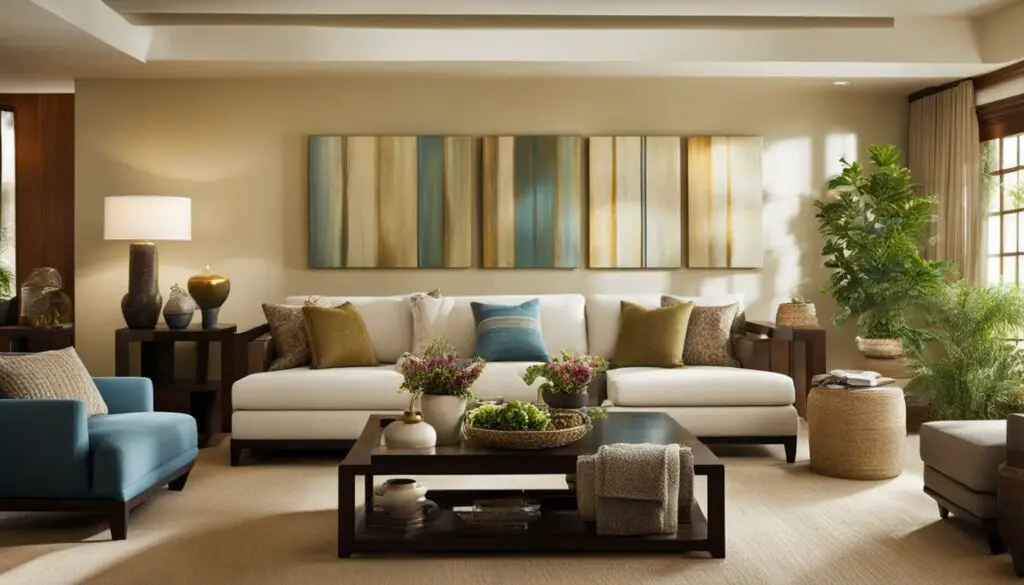
Fire represents passion, energy, and transformation. You can incorporate the fire element into your living room through candles, lamps, or a fireplace. Red, orange, and pink are also considered fire colors and can be used as accents to add warmth and vitality to the space.
Earth is associated with stability, grounding, and nourishment. To bring the earth element into your living room, consider adding plants, crystals, or stones. These natural elements help create a sense of calmness and renewal in the space.
The metal element symbolizes clarity, efficiency, and precision. You can introduce metal elements to your living room through decorative pieces, such as metal frames, sculptures, or vases. Metallic colors such as silver, gold, and bronze can also be used to enhance the energy flow in the space.
Optimizing the Layout of Your Living Room
The layout of your living room plays a crucial role in feng shui. It affects the flow of energy within the room, so it’s essential to create a space that promotes balance, harmony, and comfort. Here are some tips for optimizing your living room layout:
- Keep the entrance clear: Make sure there’s a clear path to the living room entrance, so energy can flow freely into the room. Avoid placing furniture in front of the entrance or blocking it with clutter.
- Choose the right furniture: The right furniture can help create a balanced and harmonious space. Avoid oversized pieces that dominate the room or furniture that creates sharp or pointed angles. Instead, opt for rounded or curved pieces that promote a sense of flow and movement.
- Create a seating area: Your living room should have a clear focal point, such as a fireplace or TV. Arrange your furniture in a way that creates a cozy seating area around this focal point. This will encourage conversation and relaxation.
- Position furniture correctly: When arranging your furniture, pay attention to the flow of energy within the space. Avoid placing furniture directly in front of doors or windows, as this can disrupt the flow of energy. Instead, arrange furniture in a way that promotes a sense of balance and harmony.
- Create clear pathways: The layout of your living room should enable you to move around the space with ease. Make sure there’s a clear path between furniture pieces and walls, and avoid placing furniture too close together. This will create a sense of spaciousness and promote positive energy flow.
By optimizing the layout of your living room, you’ll create a space that promotes positive energy, relaxation, and well-being. Consider implementing some of these tips and experience the benefits of a feng shui-inspired living room.
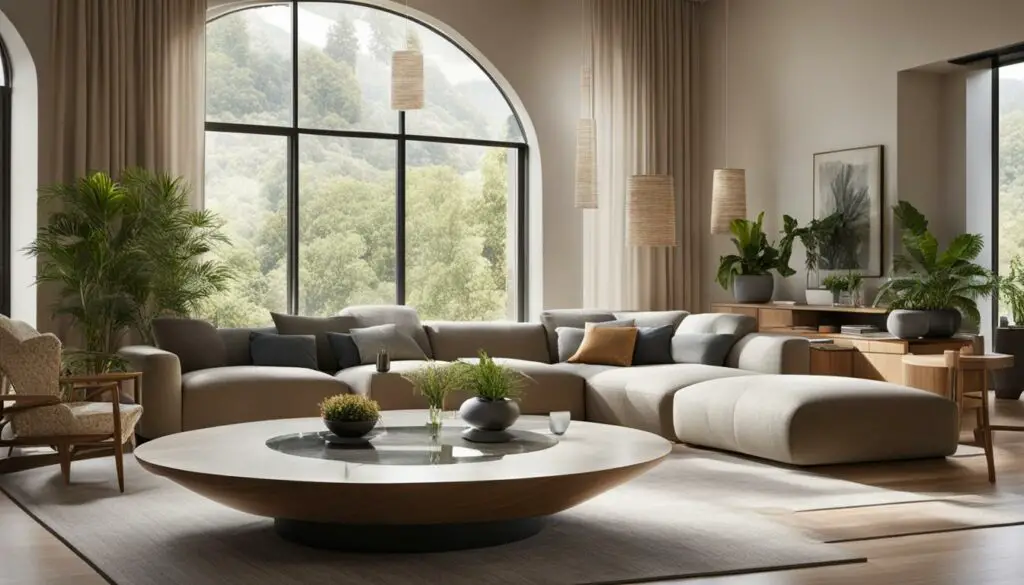
Harnessing the Power of Plants in Feng Shui
Adding plants to your living room is an excellent way to create a harmonious and balanced space based on feng shui principles. Plants bring nature’s energy and vitality into your home and can help purify the air, creating a calming and restorative atmosphere.
However, not all plants are suitable for feng shui, and some can even have a negative impact on the energy flow. It’s essential to choose plants with round, soft leaves and avoid spiky or thorny ones. Here are some feng shui plants that are considered auspicious and can enhance positive energy in your living room:
| Plant | Meaning | Placement |
|---|---|---|
| Lucky Bamboo | Brings good luck and prosperity | Place in the southeast part of the living room or near the entrance |
| Jade Plant | Symbolizes wealth and prosperity | Place in the southeast part of the living room or near the front door |
| Peace Lily | Purifies the air and promotes tranquility | Place in the northeast or southwest part of the living room |
| Rubber Plant | Symbolizes abundance and good fortune | Place in the southeast part of the living room or near the entrance |
When placing plants in your living room, consider the bagua map and the five elements. For instance, wood represents growth and vitality, so placing a healthy plant in the east or southeast part of your living room can enhance positive energy and promote growth in various aspects of your life.
Remember to care for your plants properly to ensure that they thrive. Dead or unhealthy plants can have a negative impact on the energy flow, so make sure to remove them promptly.
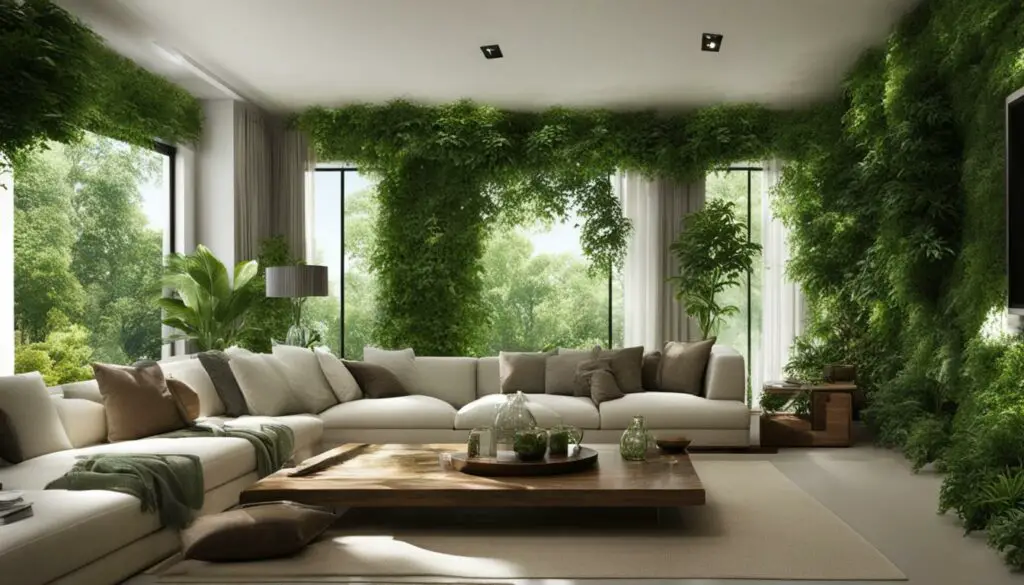
Incorporating Feng Shui Decorating Ideas
Decorating your living room in accordance with feng shui principles can be a fun and creative process. Here are some ideas to get you started:
“A room should never allow the eye to settle in one place. It should smile at you and create fantasy.” —Juan Montoya
Focal Point
Choose a focal point for your living room, such as a piece of artwork, a fireplace, or a unique piece of furniture. This will draw the eye and create a sense of balance and harmony in the space.
Natural Materials
Integrate natural materials, such as wood, stone, and bamboo, into your living room decor. These materials promote positive energy and create a calming atmosphere.
Less is More
Following feng shui principles, it’s important to create a clutter-free environment. Keep your living room clean and organized, and avoid overcrowding the space with too much furniture or decor.
Artwork and Accessories
Select artwork and accessories that inspire you and promote positive energy. Avoid artwork or decor that depicts violence, sadness, or negative emotions. Choose items that make you happy and evoke feelings of peace and tranquility.
Mirrors
Strategically place mirrors in your living room to reflect natural light and create a sense of spaciousness. However, avoid placing mirrors in a way that reflects clutter or negative energy.
Visual Interest
Enhance visual interest in your living room by incorporating different textures and patterns. Mix and match materials, such as soft fabrics and hard surfaces, to create a visually dynamic and inviting space.
Plants
Bring the outdoors in by incorporating plants into your living room decor. Plants purify the air and promote positive energy. Choose plants that are easy to care for and thrive in your living room’s lighting and temperature.
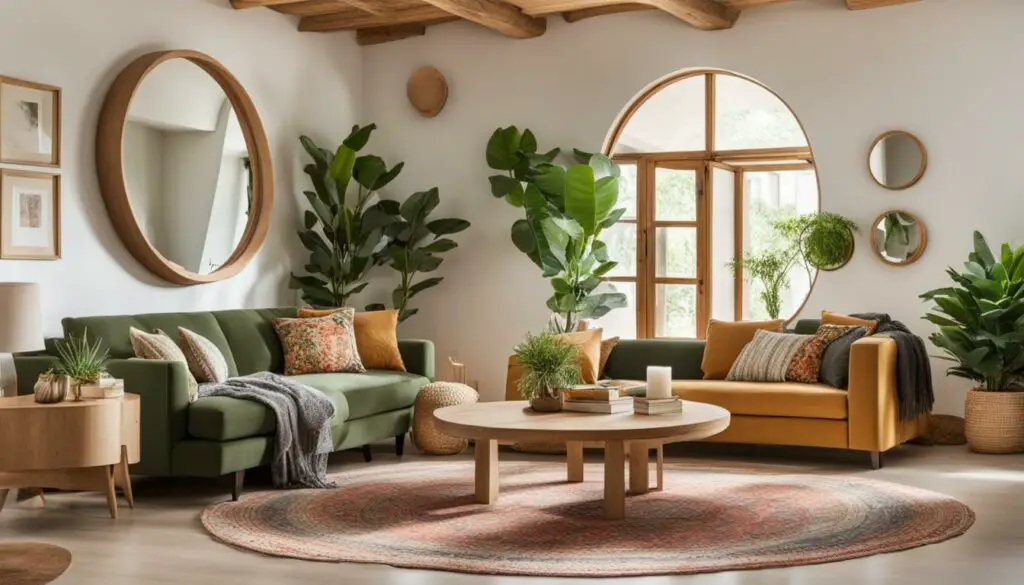
Creating Harmony with Lighting and Mirrors
Lighting and mirrors play a significant role in feng shui, as they can greatly impact the energy flow in your living room. The right lighting can create a warm and inviting atmosphere, while mirrors can reflect light and expand the space. By strategically incorporating lighting fixtures and mirrors, you can optimize the flow of positive energy in your living room.
Choosing the Right Lighting
When selecting lighting fixtures for your living room, it’s essential to consider their function and the atmosphere they create. In feng shui, it’s recommended to use multiple light sources instead of relying on a single overhead light. This helps to distribute the light evenly and create a harmonious environment.
Table lamps, floor lamps, and wall sconces are all excellent choices for creating a cozy and inviting atmosphere in your living room. It’s also important to choose bulbs with a warm and soft glow instead of harsh and bright ones, as this can create a more relaxing and comfortable space.
Additionally, you can use dimmer switches to adjust the brightness of your lights depending on the time of day and the mood you want to create. This allows you to create a more intimate and cozy atmosphere in the evening and a more energizing and vibrant one during the day.
Remember to also keep your lighting fixtures clean and well-maintained, as this can affect their energy and the overall feng shui of your living room.
Strategically Placing Mirrors
Mirrors are powerful tools in feng shui, as they can reflect light and expand the space in your living room. When placing mirrors, it’s important to consider their position and purpose.
According to feng shui principles, mirrors should be placed on walls that face the main door or window, as this helps to bring more light and energy into the space. You can also place mirrors on walls that reflect beautiful views or artwork, as this can amplify their positive energy.
However, it’s essential to avoid placing mirrors opposite doors or windows, as this can create a disruptive energy flow. Additionally, make sure to keep your mirrors clean and free of cracks or distortions, as this can affect their energy and the feng shui of your living room.
By incorporating these feng shui principles into your lighting and mirror placement, you can create a harmonious and balanced space that supports your well-being and promotes positive energy flow.
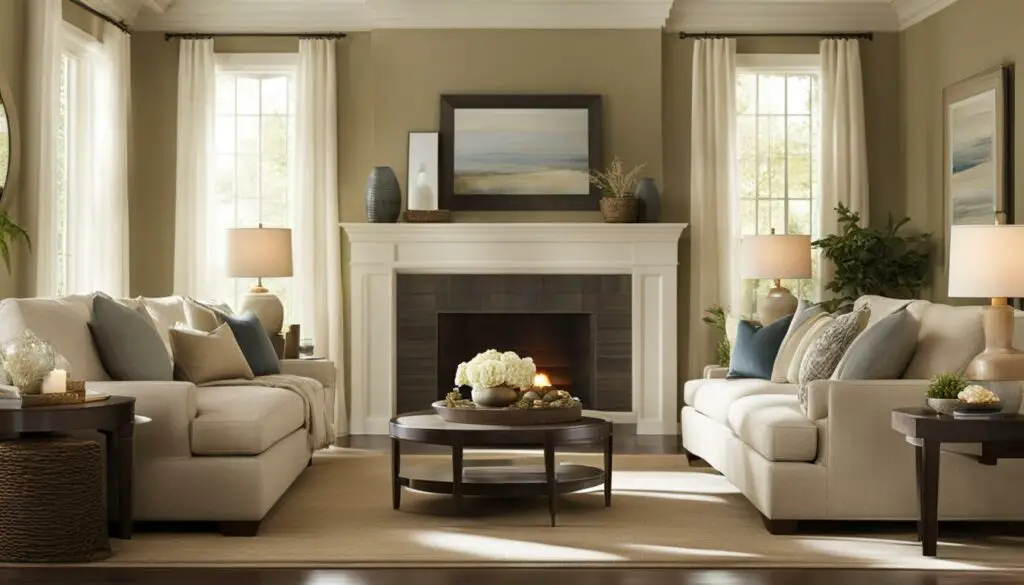
Maintaining a Clutter-Free Space
Decluttering your living room is a crucial step in creating a harmonious and balanced environment based on feng shui principles. Removing excess items and organizing your space effectively can promote positive energy flow and improve your overall well-being.
First, start by identifying items that you no longer need or use. This can include old magazines, broken electronics, or unused furniture. Consider donating or selling these items to clear up space in your living room.
Next, organize your remaining items in a way that aligns with feng shui principles. Use storage containers and shelves to keep items off the floor, as a cluttered floor can disrupt energy flow. Keep frequently used items within reach and store less frequently used items out of sight.
It’s also important to regularly clean and tidy your living room to maintain a clutter-free space. Set a routine for cleaning and stick to it to prevent clutter from building up over time.
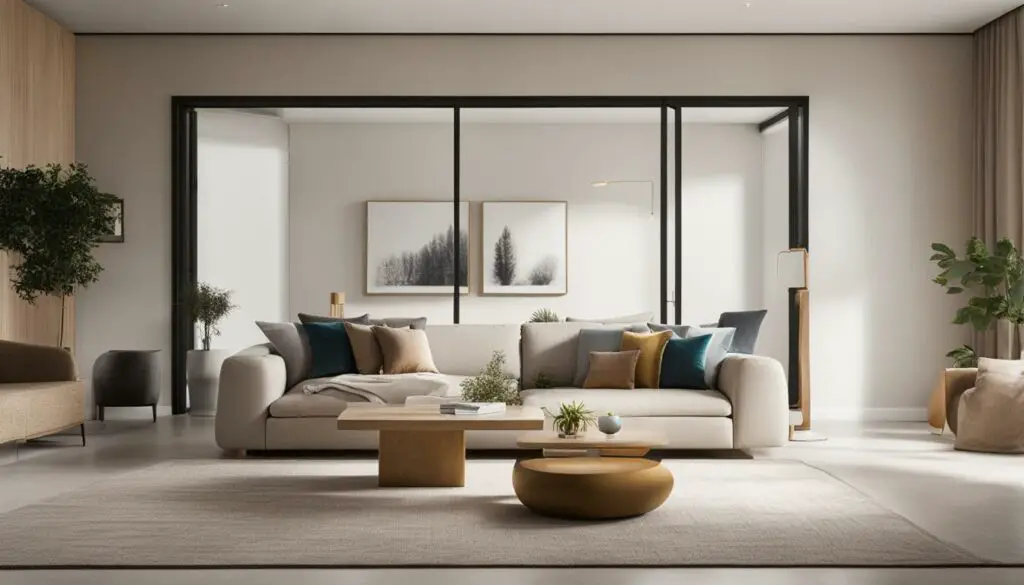
By decluttering and maintaining a clean and organized living room, you can create a tranquil and positive environment that supports your well-being.
Incorporating Sound and Aromatherapy
Sound and aromatherapy can be powerful tools in creating a calming and inviting atmosphere in your living room. The right sounds and scents can help promote relaxation, positive energy, and overall well-being.
The Benefits of Sound Therapy
Sound therapy is the practice of using sound to promote healing and relaxation. In feng shui, certain sounds are believed to have specific properties and can be used to influence the energy flow in your living room.
For example, wind chimes can help to circulate energy, while Tibetan singing bowls can produce a deep, calming sound that promotes relaxation and balance. You can also include a small fountain in your living room, as the sound of trickling water can help to activate positive energy and promote relaxation.
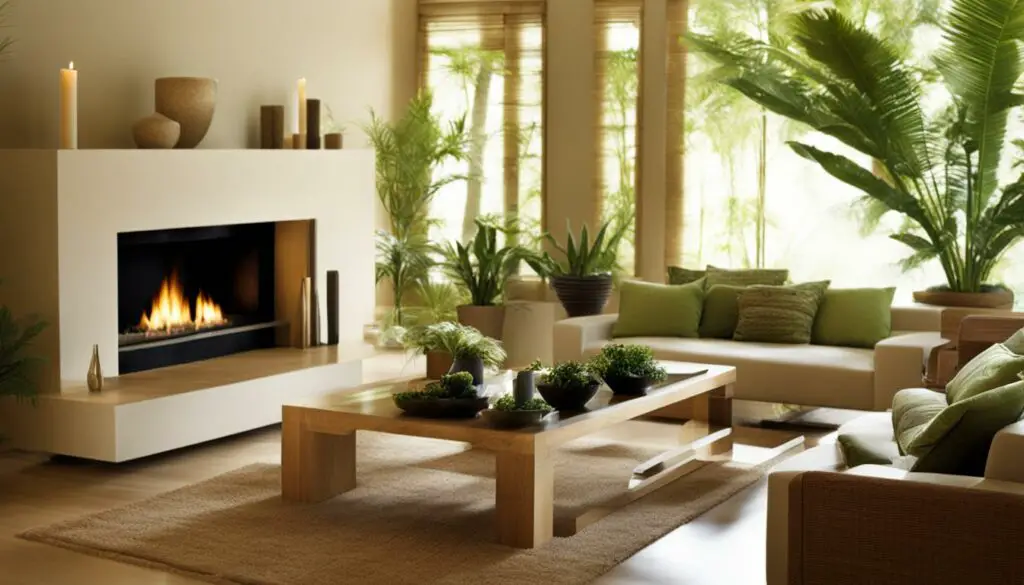
The Power of Aromatherapy
Aromatherapy is the practice of using essential oils and scents to promote healing and relaxation. In feng shui, certain scents are believed to have specific properties and can be used to influence the energy flow in your living room.
For example, lavender is known for its calming properties, while citrus scents can help to uplift and energize the space. You can use essential oils in a diffuser or add a few drops to a bowl of water and place it in the center of the room to promote relaxation and positive energy flow.
Combining Sound and Aromatherapy
By combining sound and aromatherapy, you can create a powerful and harmonious environment in your living room. For example, you can play soft music while diffusing lavender essential oil, creating a relaxing and calming atmosphere that promotes positive energy and well-being.
Experiment with different scents and sounds to find the combination that works best for you and your living room. With a little creativity and intention, you can create a harmonious and balanced space that supports your well-being.
Conclusion
Applying feng shui principles to your living room can have a significant impact on the energy flow within your home. By optimizing the layout, choosing the right colors, incorporating feng shui elements, and maintaining a clutter-free space, you can create a harmonious and balanced environment that promotes positive energy and well-being.
Don’t forget the power of plants, lighting, and mirrors in enhancing the positive energy in your living room. Additionally, consider incorporating sound and aromatherapy to further elevate the atmosphere.
Experience the Transformation
Start incorporating these feng shui tips today and experience the transformation of your living room into a serene and inviting space. With a little effort and attention to detail, you can master the art of feng shui and create a space that radiates positive energy and promotes a sense of well-being.
FAQ
How does feng shui work?
Feng shui is an ancient Chinese practice that involves arranging your living space to create a harmonious and balanced environment. By optimizing the flow of energy, or chi, feng shui aims to promote well-being and attract positive energy.
Can anyone use feng shui in their living room?
Yes, anyone can incorporate feng shui principles into their living room design. Whether you rent or own your home, feng shui can help create a more peaceful and inviting space.
What are some common feng shui mistakes to avoid?
Some common feng shui mistakes to avoid in your living room include cluttered spaces, poor lighting, and furniture arrangement that blocks energy flow. It’s important to create a clean, well-lit, and balanced space to maximize the benefits of feng shui.
How can I choose the right feng shui colors for my living room?
When choosing colors, consider the energy you want to bring into your living room. For example, warm colors like red and orange can promote energy and passion, while cool colors like blue and green can create a calming and soothing atmosphere.
Should I use specific furniture placement in my living room for feng shui?
Yes, furniture placement is important in feng shui. Avoid blocking energy flow by keeping furniture away from doorways and windows. Create a balanced layout with comfortable seating arrangements that encourage positive interactions.
How can I incorporate feng shui elements in my living room?
You can incorporate feng shui elements, such as water, wood, fire, earth, and metal, into your living room through decorations, artwork, and furniture choices. For example, a small indoor water feature can bring the element of water into your space.
Can plants enhance positive energy in my living room?
Absolutely! Plants are considered powerful allies in feng shui. They bring vitality and nature’s energy into your living room. Choose plants with rounded leaves or vibrant flowers to promote positive energy and place them in areas with good natural light.
Are there any specific decorating ideas that align with feng shui principles?
Yes, there are several decorating ideas that align with feng shui principles. Consider using mirrors to reflect light and expand your space, choosing artwork that evokes positive emotions, and keeping your living room clutter-free to maintain a harmonious environment.
How can lighting and mirrors impact feng shui in my living room?
Lighting fixtures and mirrors can significantly influence the energy flow in your living room. Use a combination of natural and artificial lighting to create a balanced atmosphere. Mirrors can be strategically placed to reflect light and expand the space.
Why is decluttering important in feng shui?
Decluttering is an essential aspect of feng shui as it allows energy to flow freely throughout your living room. Remove unnecessary items, organize your belongings, and create a serene environment that promotes relaxation and well-being.
Can sound and aromatherapy be used in feng shui?
Yes, sound and aromatherapy are often incorporated into feng shui practices to enhance the overall ambiance of your living room. Gentle sounds like wind chimes or soothing music can promote relaxation, while calming scents like lavender or citrus can uplift the energy in the space.
